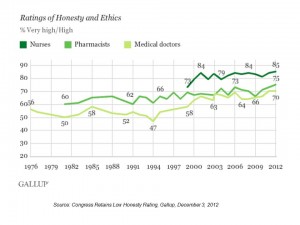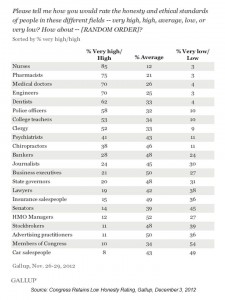 Nurses, pharmacists and doctors rank tops with Americans when it comes to honesty and ethics. Most people also rate engineers, dentists, police officers, clergy and college teachers as high on honesty metrics.
Nurses, pharmacists and doctors rank tops with Americans when it comes to honesty and ethics. Most people also rate engineers, dentists, police officers, clergy and college teachers as high on honesty metrics.
Lawmakers (THINK: Congress) and car salesman fall to the bottom of the honesty-and-trust roster, who only 1 in 10 Americans believe act with honesty and integrity. Other low-ranking professions on this list are HMO managers, stockbrokers, and folks in the advertising business.
Gallup measures six health care professions in this poll: nurses, pharmacists, doctors, dentists, psychiatrists and chiropractors. Nurses continue to out-rank every profession in the survey since first measured in 1999 (except for firefighters who garnered first place in 2001 right after the 9/11 attacks). Pharmacists used to hold the top spot before nurses were included in the survey; they’re two percentage points up in the poll this year.
Psychiatrists and chiropractors fall under the 50% mark, below clergy, in honesty and ethics. Consider them in the middle of the pack of 22 professions.
For this study, Gallup interviewed 1,015 U.S. adults via phone in November 2012.
Health Populi’s Hot Points: The trust that people have in nurses, pharmacists and doctors is the currency for health engagement: getting people involved in their own health through shared decision making and collaborating “health making” with these touchpoints in the health ecosystem. In particular, the pharmacist should and I anticipate will play a growing role in retail health, where people live, work, play and shop.
I had one of those surprising, health-engaging moments last week at a new retail pharmacy chain store in my town where I had not visited before. I had read about a novel OTC migraine headache supplement that I wanted to purchase for my daughter, who is a teenage migraneur. A press release about the supplement came across my Google alert on migraines, and said that the pharmacy chain would be regularly stocking the product which had previously been available through online mail order. I stopped into the shop and couldn’t find the product on the headache product shelf. I asked the pharmacist about the availability of the product, and he was unaware that the store would be regularly carrying it — but happy to recommend it as his wife was a regular user of it. He quickly volunteered to order it via his local supplier, who would deliver it the next morning. We shared perspectives on headaches, triggers, and lifestyle behavior modification.
I picked up the supplement the next day, happy to pay the $21 cost out-of-pocket, and I brought the pharmacist a printout of the press release which he had not seen. He made certain to tell me that the supplement must be taken twice a day, and to be patient with it for 90 days when the riboflavin and magnesium would have sufficient time to build up in my daughter’s system. Being a patient-patient taking a large-sized supplement 2x/day isn’t easy for a teenager, but we heard the pharmacist’s message loud and clear and will be adherent to the instructions.
What should delight the pharmacy chain company is that I had held a very low opinion of the chain based on my experience at a different local storefront, which has long lines, a clueless staff, inconvenient parking, and an old dingy store environment.
The new pharmacy storefront, about 5 miles from the old one, is new, clean, full-service, brightly signed, and staffed by a switched-on pharmacist who ‘got’ me and my situation within 30 seconds. My opinion of the chain has turned around, thanks to this individual.
This is a simple real-life scenario which speaks to the role of the pharmacist in our daily lives. Trustworthy retail health touchpoints help us take care of ourselves, saving resource-stretched doctors and nurses in primary care medical homes time to see patients who are sicker and need the real-time eyes and ears of the physician.
For our part, we will report back to the pediatrician and neurologist our daughter’s use of the product, and she will keep her headache diary current to track whether this supplement will prophylactically help the migraine condition.
Welcome to healthcareDIY, where trust with nurses, pharmacists and doctors can bolster our health through greater health engagement.





 Thanks to Feedspot for naming this blog, Health Populi, as a
Thanks to Feedspot for naming this blog, Health Populi, as a